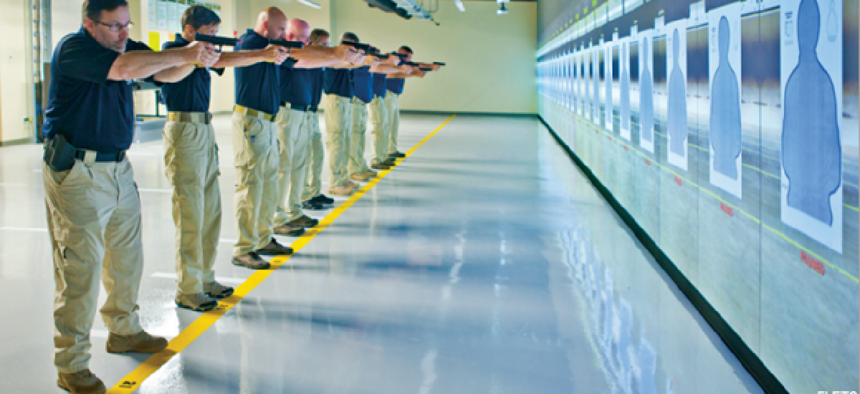Virtual firearms training minimizes cost, and danger


Connecting state and local government leaders
The Federal Law Enforcement Training Centers is currently testing one of the most advanced, networked virtual firearms training ranges, which officials anticipate should become fully operational later this year.
The Federal Law Enforcement Training Centers is currently testing one of the most advanced, networked virtual firearms training ranges, which officials anticipate should become fully operational later this year.
FLETC, a part of the Department of Homeland Security, provides instruction to state, local, rural, tribal, territorial and international law enforcement agencies, and trained more than 70,000 law enforcement officers in 2013. Its virtual ranges offer both training efficiencies and greater safety.
Besides freeing up time on live-fire ranges and increasing throughput, the virtual ranges also cut ammunition usage, lower maintenance costs, and have a smaller impact on the environment. Officials estimate a potential cost-savings of $379,000 annually.
While the installation was completed last October, officials have been extensively running pilot classes through the system since December, a process that should continue for another few months, said Rodney Burnett, lead firearms instructor at FLETC’s Glynco, Ga., headquarters. Burnett said the agency is developing protocols and procedures for how to use the virtual ranges, which are designed to supplement -- not replace -- live-fire training.
The system, which uses commercial-off-the-shelf technology including laser handguns, cameras and projectors, has taken several years to develop. Officials said they have been deliberate at each step to ensure the virtual range provides the proper environment and tools to help federal agents and others become more proficient with handguns. Even with the virtual system, students still train and qualify on live-fire ranges.
Students who don’t qualify on the live range can lose their field agent position, said Dan Balash, FLETC’s IT program manager for the virtual range. “So we’re being careful at each stage ... to make sure we’re not putting something in the system that’s going [to] negatively impact the students,” he said.
Equal to the test
Before committing to the virtual range, FLETC wanted to know if students who trained on a virtual range could get qualifying scores on the semiautomatic pistol course, which all students must pass.
In 2010, the agency conducted a study to see whether a simulation could provide effective, viable and safe training, especially for officers and agents who may never have handled a handgun. The simulation, FLETC thought, could help students better understand stance, grip, sight alignment and trigger control, which are fundamentals taught in the basic marksmanship instruction course, Burnett said.
FLETC tested both untrained volunteers and students from the U.S. Marshals Service and found that differences in qualification scores between those who received virtual training and those who trained on a live firing range were statistically insignificant.
Once the study proved that a virtual range could provide a safer environment where students could learn firearms skills, the agency decided in March 2012 to put it into production. It issued a request for information with specific requirements that sought to replicate the look, feel and functionality of a live range, Balash said.
FLETC wanted a system with a 24-point range –enough capacity for two dozen individuals to shoot targets at the same time—using laser handguns. The system also needed to automatically track and record a student’s performance, and be built with COTS software and hardware.
After awarding the contract to Stafford, Texas-based Laser Shot, it took roughly a year to construct and test the range. In the meantime, FLETC remodeled one of its indoor live-fire ranges into three virtual rooms, each with 24 firing points for a total of 72.
Networked PCs on Windows
Each room has an identical system consisting of nine rack-mounted PCs running Windows 7, a giant screen, projectors, cameras, speakers and laser weapons kits. The instructor uses one computer to control the other eight. Each of the eight PCs controls three firing points for a total of 24.
According to Balash, the instructor creates settings for the firing range, such as simulating the distance to the target, number of shots fired and even if it’s day or night. The system communicates those settings to the client machines, which runs the simulation on the firing lanes.
The laser handguns fire invisible infrared beams at virtual targets, which can be replicas of paper targets with concentric rings that have different point values. Cameras detect the beams on the wall and record the “shots” on the target.
The system tracks a student’s performance and reports it to the instructor, who can then display the scores and walk each student through each shot fired. Instructors can even talk with students in a normal tone – a practice that’s impossible in a noisy live-fire range where everyone wears hearing protection.
Instructors can also create training games for the students. In one game called shapes and colors, students have to.identify and shoot only red balloons among a bunch of moving balloons, explained Balash. A variant of that game uses playing cards that move into range. Students are asked to find and shoot the ace of spades, which teaches them target discrimination.
Burnett said FLECTC is also developing requirements to use the technology for simulations involving driving, judgment pistol shooting and other scenarios. But that’s a couple of years down the line.
FLETC is completing a 24-point virtual firing range in its Artesia, N.M., location and plans to install another virtual system in Charleston, S.C. next year. While officials declined to disclose the project’s cost, they said it’s substantially cheaper than building a live-fire range.
NEXT STORY: Website ads help support Washington state’s DOT


